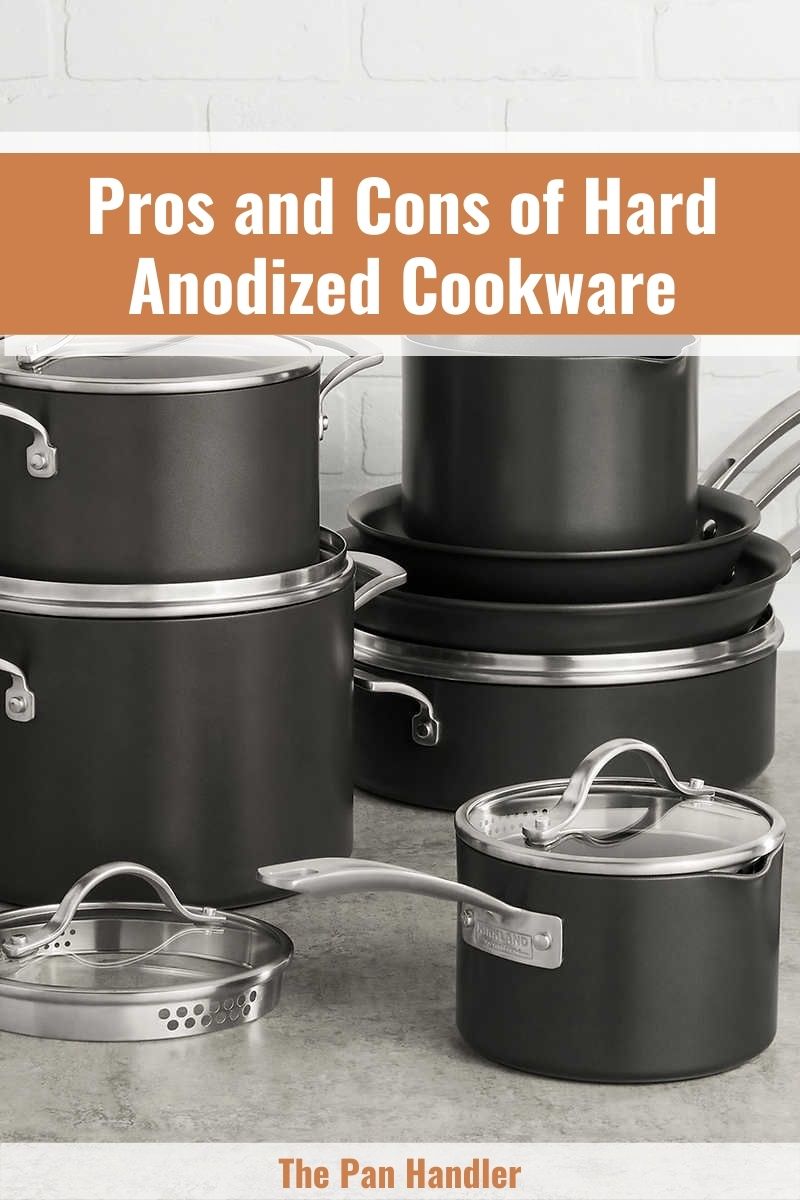There is indeed a wide range of materials that you can use to make different types of cookware, and one among many types is hard-anodized cookware.
Hard anodized cookware is generally preferred over other common cookware types. It is made out of aluminum which undergoes a process that makes it more durable and sturdier.
Few things about hard anodized cookware
As the term implies, the aluminum in this cookware has been anodized in sulfuric acid as it was submerged in a chemical solution bath.
The entire process will then produce oxides that will turn into a hardened layer to make the whole cookware resistant to corrosion and more resilient than other cookware types.
The hard anodized cookware also falls under the non-stick cookware category and is often compared to Teflon and Cast Iron. However, consumers highly recommend this type of non-stick cookware because it is recorded as non-reactive and non-toxic non-stick cookware. It is scratch-resistant without compromising its other features, such as heat retention and versatility to use on cooktops.
Pros and Cons of Hard Anodized Cookware
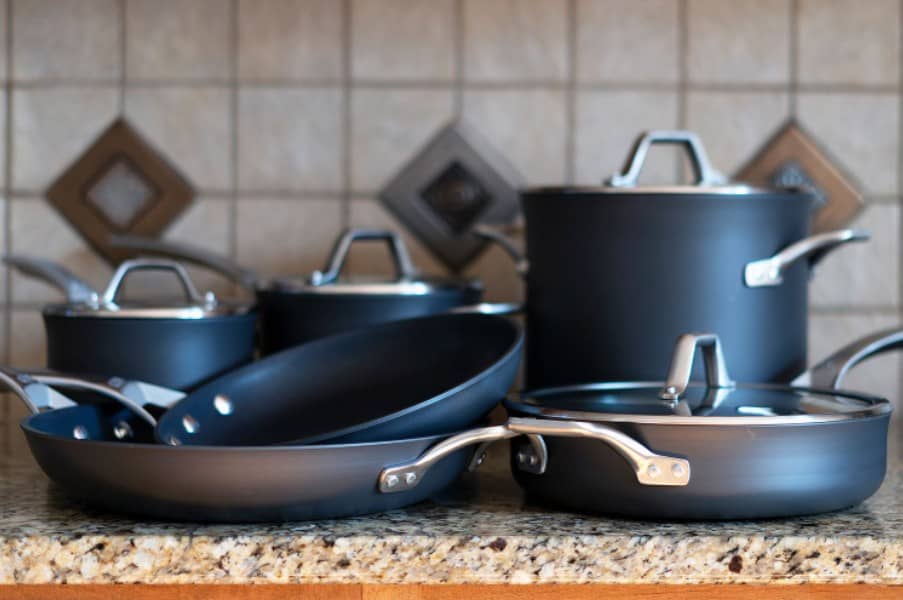
Of course, before you spend your hard-earned money and invest in something, you will then be curious if it will be worth every penny.
Take a quick look at the table below regarding the pros and cons summary of the hard-anodized cookware. Use this as your buying guide if you are in a dilemma.
| PROS | CONS |
| Lightweight | Cannot withstand high heat temperature |
| Scratch-resistant | More expensive |
| Good heat conductor and good heat retention | Not induction cooktop safe |
| Non-reactive | No cooking spray |
| Corrosion-resistant | Short or limited lifespan |
| Non-stick | Cannot be used to store food |
| Easy to clean | Not dishwasher safe |
| Durable | Inconsistency in quality |
| Healthy cooking | Not detergent safe |
9 Advantages of Hard Anodized Cookware
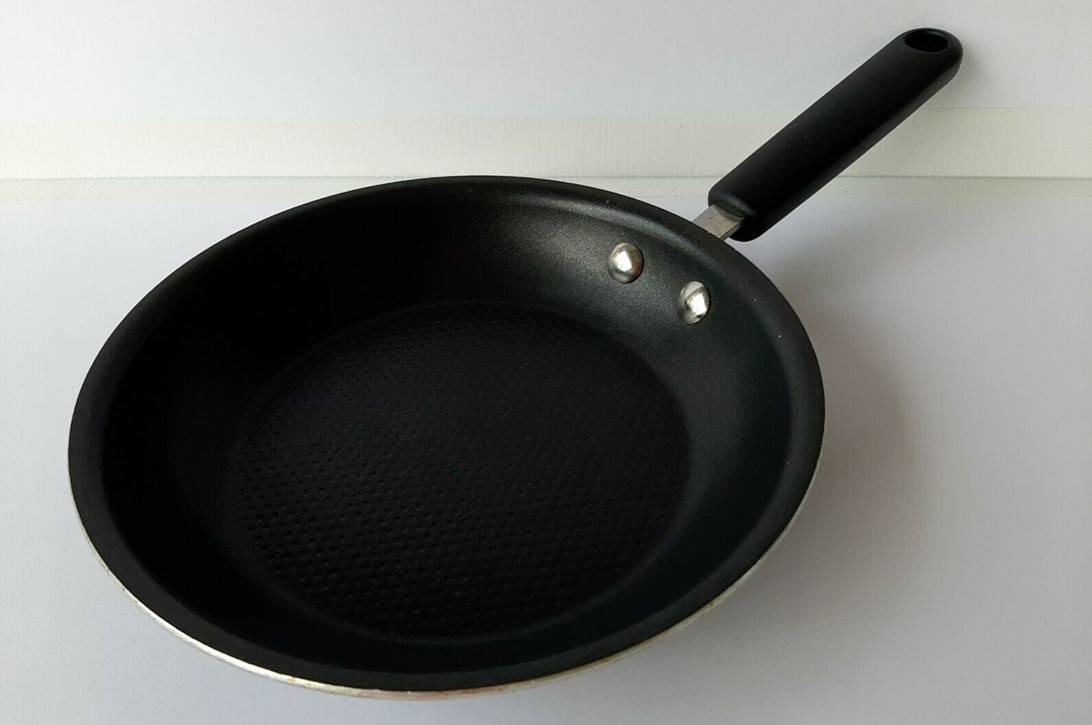
People purchase a product once they learn about the characteristics and advantages. Most people have a checklist to see if their preferences are on the lineup of the advantages of the specific product.
Lightweight
The aluminum material is naturally lightweight compared to the other materials used to make cookware. Having lightweight cookware makes everything easier and faster.
Scratch Resistant
The hard anodized cookware went through the anodizing process, making it scratch-resistant due to the additional layers formed.
Good heat conductor and good heat retention
The hard anodized cookware is an excellent addition to your collection. It is an excellent investment because it is one of the few cookware that is a great conductor of heat and, at the same time, spreads the heat evenly on the cooking surface. Moreover, it is also great at heat retention.
Non-reactive
It is safe to cook any food, even the acidic ones because the hard anodized cookware is non-reactive.
Corrosion-resistant
The coating of the hard anodized cookware makes it resistant to corrosion, salt, and even erosion.
Non-stick
The hard anodized cookware has a coating that also gives its nonstick properties.
Easy to clean
The smooth surface of the hard anodized cookware makes it easier to clean compared to any other cookware material.
Durable
The hard anodized aluminum is highly durable as it has been coated with an oxide layer since it underwent the anodizing process. In line with this, the process made it possible for the aluminum material to be less vulnerable to warping, corrosion, and rusting.
Healthy cooking
The good side of using hard-anodized cookware is that it allows you to live healthy while not starving yourself just to cut out your diet. It promotes a healthy lifestyle because it requires less butter and less cooking oil.
9 Disadvantages of Hard Anodized Cookware
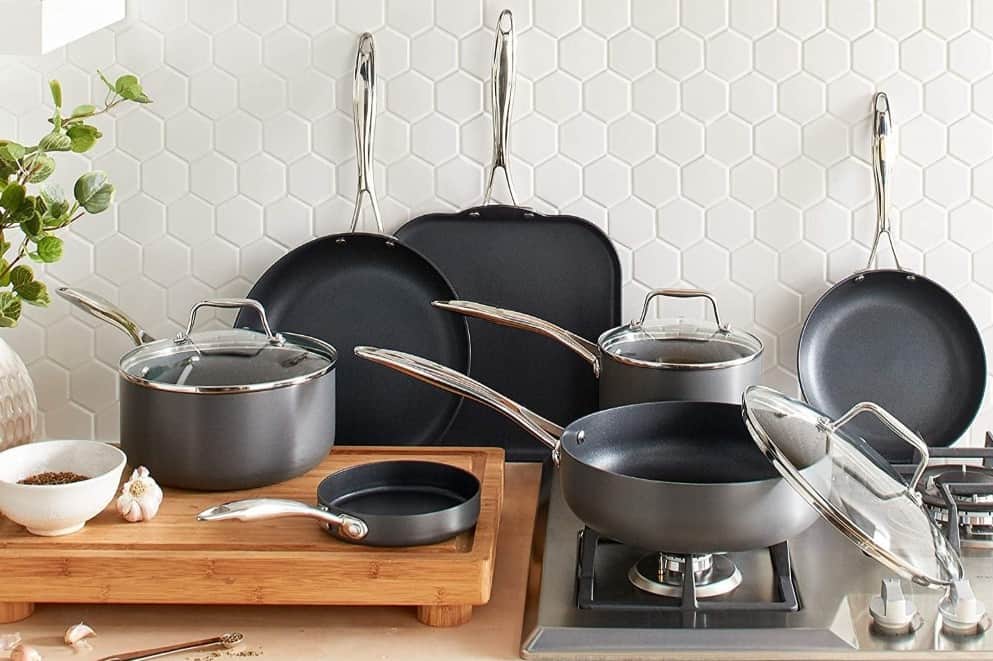
It is also significant that you know the disadvantages of hard anodized cookware because you will be able to decide without prejudice. These disadvantages may be non-negotiable to you; that is why you need to be enlightened while you are in your discernment process if it is worth every penny when you purchase the hard-anodized cookware.
Cannot withstand high heat temperature
The hard-anodized type of aluminum cookware cannot withstand high heat temperatures. Thus, it is not safe to use in an oven or broiler with 500 degrees Fahrenheit.
Though warping will not be a concern when the hard-anodized cookware is exposed to extreme heat temperature, the tearing off of the nonstick will be your serious concern and the potential health risk when exposed to harmful fumes that have been released.
More expensive
The hard anodized cookware is more expensive than the other aluminum types, especially compared to the non-anodized ones. However, when you compare this over the other cookware materials, it comes cheaper.
Not induction cooktop safe
The typical cooktop these days is the induction stovetop. If you have the same, then sad to say, but the hard anodized cookware is incompatible with the induction stovetop. However, it can only be possible if a metal disc is attached to the bottom surface, making it safe to use with induction.
No cooking spray
It is not advisable to use cooking spray on hard-anodized cookware. Though it is common to do it the first time you use it. However, it is not recommended to use a cooking spray regularly because the chemical may leave sticky remnants after it evaporates.
Short or limited lifespan
The anodized coating of this cookware does not last a lifetime. There will come a time when you need to change your nonstick cookware as its average lifespan is only between 2 to 5 years. Being knowledgeable on how to care for hard-anodized cookware properly will be your advantage in optimizing its lifespan.
Cannot be used to store food
It is impossible to store your food in hard-anodized cookware even after cooking, as the lid cover is not designed to close securely.
Though the metal utensils have a low probability of tearing off the coating of the hard-anodized cookware, that is not safe for dishwashers.
It is highly advisable not to use this in a dishwasher because the entire process, as it undergoes high heat temperature and is exposed to harsh chemicals, the coating may degrade in no time.
Inconsistency in quality
There is no assurance that each hard anodized cookware is the same as one another. The quality varies depending on the brand and the process the manufacturers do.
Not detergent safe
You should use mild liquid dishwashing soap when you handwash hard-anodized cookware. Using a dishwasher or detergents that contain harsh chemicals may negatively impact the coating of the cookware.
Is it safe to use hard anodized cookware?
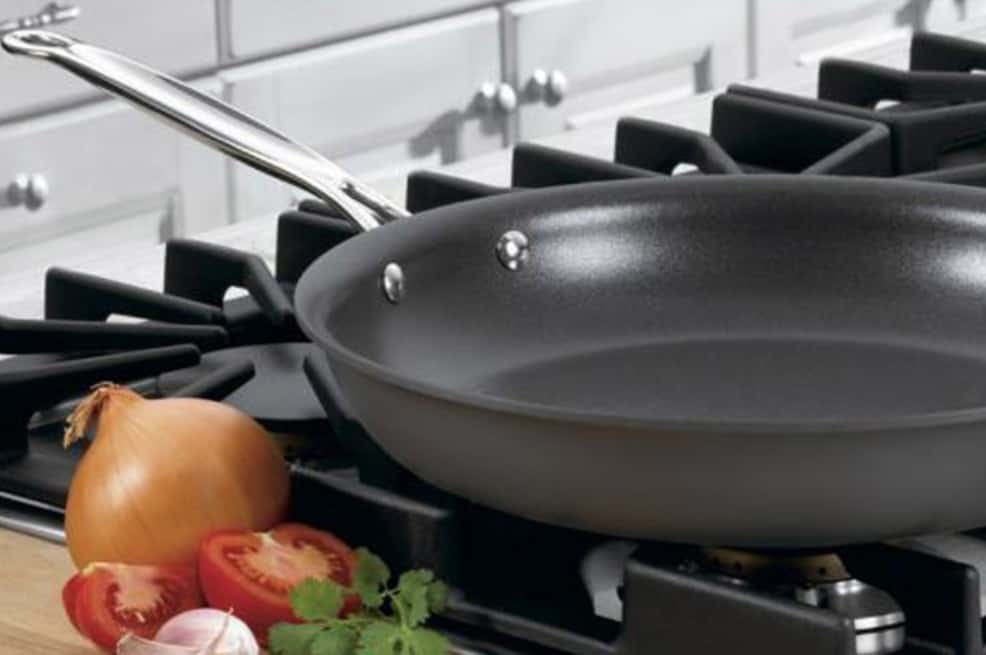
One of the many reasons consumers opt to invest in hard anodized cookware is that it is safe to use and has no health risks recorded.
Though this may be made out of aluminum, the hard anodization coating of this cookware has gone through the electrolysis, leaving no room for any toxins and no unstable organic compounds used.
Furthermore, hard anodized cookware is known to be safe for humans and environmentally friendly, as its aluminum oxide coating does not produce hazardous or toxic waste unless the coating wears out.
Ensure that the anodized coating will not wear or tear out because that is when the aluminum will be exposed, which will be unsafe to use as aluminum cookware is also known to have been recorded with health risks due to the toxicity when ingested.
Hard-Anodized Cookware Care Guide Tips
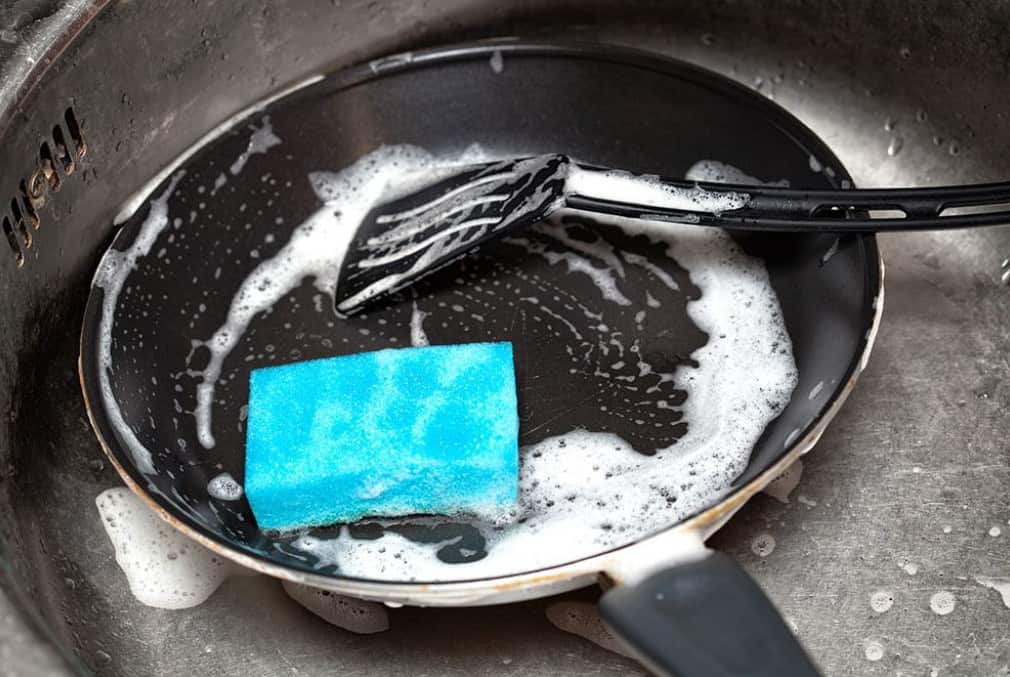
It is essential that you know very well how to care for your hard-anodized cookware. Though some brands may provide their manual or care guide, it is vital that you know how to properly care for hard anodized cookware, even just the basics.
Seasoning is a must
Since the hard anodized cookware also belongs to the nonstick cookware family, it also requires seasoning but is not as regular as how you should season your cast iron pan. It only needs to be seasoned with flaxseed oil at least twice a year, making it low maintenance.
Avoid extreme heat temperature
It is highly advisable that you cook your meal in hard-anodized cookware at a low or medium heat temperature. This will prevent the heat from ruining the anodized coating of your cookware.
Avoid abrupt change of temperature
Ensure that you allow your cookware to cool down after cooking before rinsing it with cold water.
Store hard anodized cookware properly
The durability and being scratch-resistant to the hard-anodized cookware allow it to be stacked on top of each other. However, despite all these characteristics, you still have to ensure that you store them and carry them out properly, preferably in an enclosed area where there will be no chances of contamination.
Hand-wash the cookware instead of putting it in a dishwasher
It is highly advisable that you hand wash hard anodized cookware to avoid any damage that may occur. You can wash it with regular liquid dishwashing and hot water or with the use of baking soda and such to remove any stubborn stains.
Learn how to clean your hard anodized cookware by watching this clip:
Summary
You now know everything about hard anodized cookware pros and cons. This time, it will be easier for you to discern if you should or should not spend your hard-earned money with it. Use this as your buying guide by checking the advantages and disadvantages of using and having hard-anodized cookware.
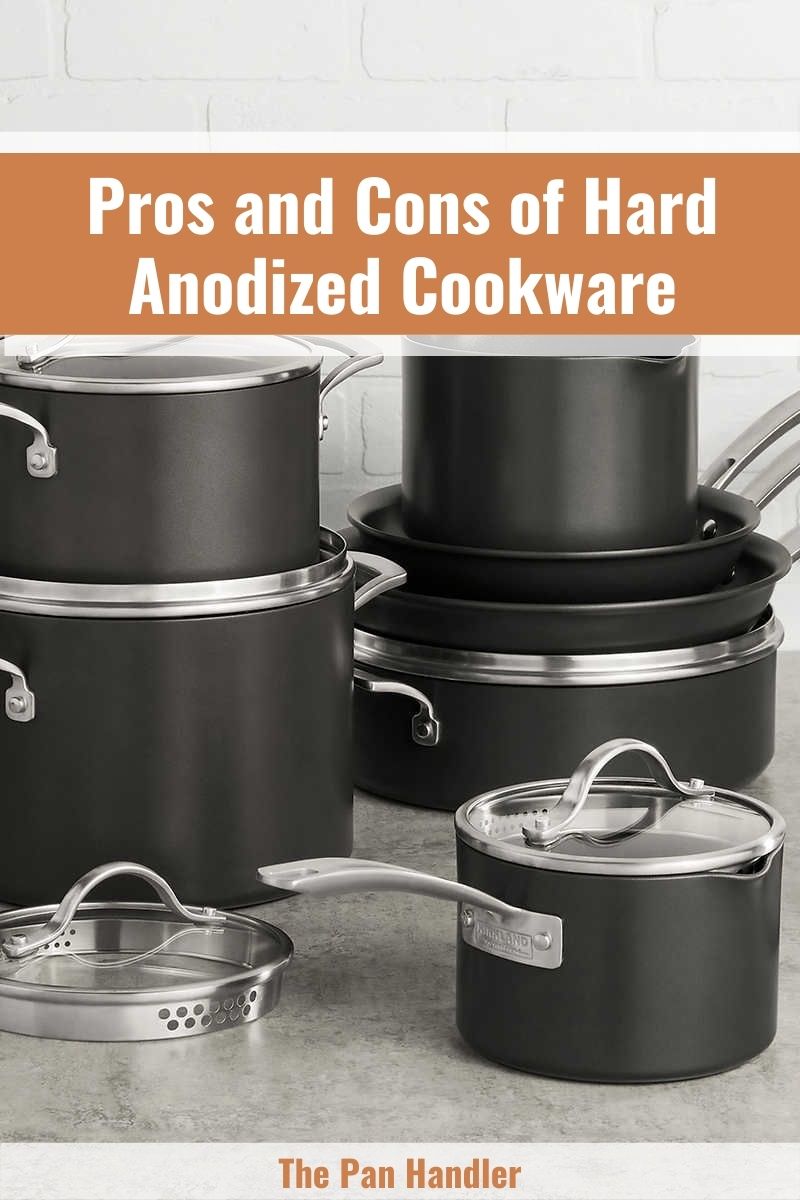

Michael Johnson is the founder of Pan Mastery, Inspired by his blacksmith grandfather’s legacy has a deep appreciation for hand-crafted pots and pans, he provides invaluable guides, reviews, and recipes to enhance your culinary journey.

